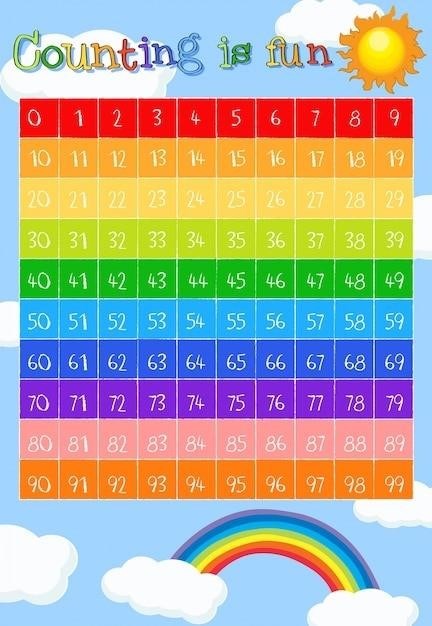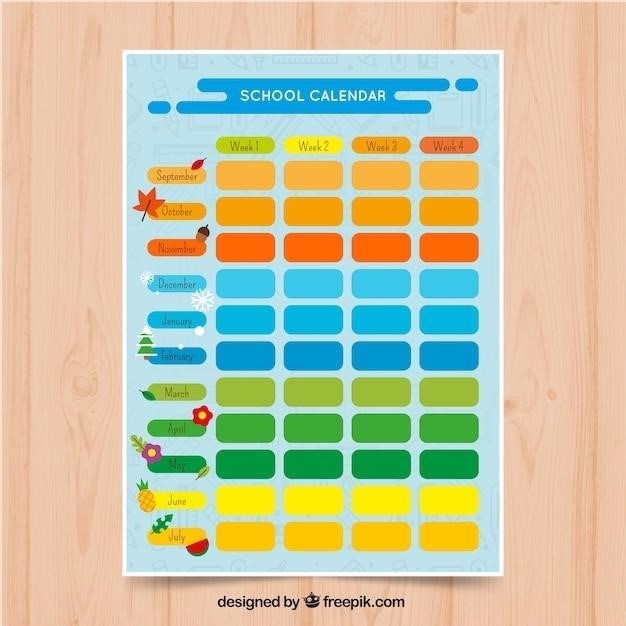Conversion Tables⁚ Pounds to Kilograms
This section provides comprehensive conversion tables for pounds to kilograms. Downloadable PDF versions are available for easy reference. These tables offer quick and accurate conversions for a wide range of weights, simplifying calculations and comparisons.

Downloadable PDF
For your convenience, we offer a downloadable PDF containing comprehensive pounds-to-kilograms conversion tables. This readily accessible resource eliminates the need for online access, allowing for quick and easy conversions anytime, anywhere. The PDF includes a wide range of values, ensuring you find the precise conversion you need, whether you’re working on a small-scale project or a large-scale undertaking. The clear and concise format ensures effortless navigation, making it an invaluable tool for students, professionals, and anyone needing accurate pound-to-kilogram conversions. Download your free PDF today and keep this essential conversion tool readily available for all your weight conversion needs. This user-friendly document is designed for optimal readability and easy printing, providing a practical and portable reference for various applications. The PDF’s compact size makes it suitable for storage on various devices, providing instant access to accurate weight conversions whenever required. The high-quality PDF ensures clarity and legibility, maintaining the precision of the conversion data. The downloadable PDF is an invaluable resource offering a consistent and reliable method for converting pounds to kilograms.
Comprehensive Conversion Tables
This section presents extensive conversion tables detailing the precise equivalence between pounds and kilograms. These tables cover a wide spectrum of weights, ranging from fractions of a pound to several thousand pounds, ensuring accuracy across a broad application range. Each table entry is meticulously calculated to provide the most accurate conversion factor possible. The tables are organized in a clear and user-friendly format, making it simple to locate the required conversion quickly and efficiently. Whether you’re converting small weights for personal use or larger weights for industrial applications, these tables guarantee precision and reliability. We’ve taken extra care to ensure that the tables are easy to read and understand, regardless of your level of familiarity with metric conversions. They serve as a valuable reference for various tasks, from cooking and baking to engineering and scientific calculations. The tables are designed to be both comprehensive and user-friendly, combining precision with ease of use. This eliminates the need for complex calculations, enabling fast and reliable conversions for all your needs. The tables are formatted for easy readability and are suitable for various applications requiring accurate weight conversions.
Pounds to Other Units
Beyond kilograms, our resource extends conversion capabilities to a multitude of other units of mass and weight. Need to convert pounds to grams, ounces, or even tons? Our comprehensive guide provides detailed conversion tables for these and other units, ensuring seamless transitions between different measurement systems. We’ve included conversions to less common units like slugs and even historical units to cater to a broad range of applications. Each conversion table is meticulously designed for clarity and accuracy, ensuring that users can confidently convert pounds to the specific unit they require. The tables are formatted for easy navigation, with clear headings and consistent units of measurement. The inclusion of multiple units allows for greater flexibility in various contexts, whether it’s a simple recipe conversion or a complex engineering calculation. From the everyday to the specialized, our tables provide the tools to handle any conversion need. These tables provide a convenient reference for both metric and imperial systems, simplifying the process of converting pounds to a variety of units. With our comprehensive resource, you’ll find the exact conversion you need, quickly and accurately.

Kilograms to Other Units
This section focuses on conversions from kilograms to a variety of other weight and mass units. While the primary focus is often on the kilogram-to-pound conversion, our resource expands this to encompass a broader range of units. This includes conversions to grams, milligrams, tons, and ounces, ensuring users have a comprehensive toolkit for various applications. We’ve also incorporated less frequently used units to accommodate specialized needs, providing a complete and versatile conversion resource. Each conversion table is clearly presented, with the aim of simplifying the conversion process and minimizing the potential for errors. The tables are designed with user-friendliness in mind, featuring clear headings, consistent units, and a logical layout for easy navigation. Whether you’re working on a simple recipe adjustment or a complex engineering calculation, our tables provide the necessary tools for accurate and efficient conversions. Users can confidently convert kilograms to the required unit with ease and precision, regardless of the level of familiarity with different measurement systems. The tables serve as a handy reference for both metric and imperial units. We ensure accuracy and clarity, facilitating various tasks requiring weight conversions.
Conversion Formula and Examples
Understanding the underlying formula is crucial for accurate conversions. The fundamental equation for converting pounds to kilograms is⁚ Kilograms = Pounds × 0.453592. This formula allows for precise calculations beyond the limitations of pre-made tables. For instance, converting 50 pounds to kilograms involves multiplying 50 by 0.453592, resulting in approximately 22.68 kilograms. Conversely, to convert kilograms to pounds, use the inverse formula⁚ Pounds = Kilograms × 2.20462. Let’s illustrate with an example⁚ converting 10 kilograms to pounds involves multiplying 10 by 2.20462, yielding approximately 22.05 pounds. These formulas provide flexibility for any weight value, ensuring accurate conversions regardless of the unit’s magnitude. The inclusion of detailed examples ensures clarity and allows users to easily apply the formulas to their specific needs. By understanding these core conversion principles, users can confidently perform conversions even without readily available tables. This empowers users to handle various weight-related calculations independently and accurately, furthering their understanding of unit conversions.
Practical Applications of Conversion
The ability to convert between pounds and kilograms finds extensive use in various real-world scenarios. International trade and shipping frequently require weight conversions to ensure accurate documentation and compliance with regulations. In the medical field, converting weight measurements is essential for administering appropriate dosages of medication and monitoring patient health. The food industry relies on precise weight conversions for recipe scaling, ingredient sourcing, and packaging. Furthermore, weight conversions are critical in engineering and construction for material calculations and structural design. Fitness and health enthusiasts often utilize these conversions for tracking progress, setting fitness goals, and comparing data across different systems of measurement. Even everyday tasks such as cooking or online shopping can benefit from accurate weight conversions. The ease of converting between pounds and kilograms using readily available tools or formulas enhances efficiency and accuracy across these varied applications. Understanding and utilizing these conversions are fundamental to success in multiple professions and everyday life;
Online Conversion Tools
Numerous online tools simplify the process of converting pounds to kilograms. Many websites offer free, user-friendly converters that require only inputting the weight in pounds. The result, displayed in kilograms, is typically immediate. These tools often handle various units of weight, allowing conversions beyond pounds and kilograms. Some advanced online converters provide additional features, such as the ability to convert multiple values simultaneously or save conversion history. Mobile applications also offer similar functionality, providing convenient on-the-go conversion capabilities. The accuracy of these online tools generally depends on the algorithm used; reputable websites and apps typically employ precise algorithms to ensure accurate results. These online resources eliminate the need for manual calculations and provide a quick, efficient way to perform conversions, making them invaluable for various applications. Choosing a trustworthy website or app is crucial to ensure the reliability of the conversion results;
Accuracy and Precision of Conversions
The accuracy of pound-to-kilogram conversions hinges on the precision of the conversion factor used. The commonly accepted factor is 1 kg = 2.20462 lbs. However, using fewer decimal places may introduce minor inaccuracies, especially when dealing with larger weights. Online calculators often use algorithms with higher precision, offering more accurate results than manual calculations using rounded conversion factors. The level of precision required depends on the application. For everyday purposes, a rounded conversion factor might suffice, but scientific or engineering applications necessitate higher precision. Understanding the inherent limitations of the conversion factor is crucial in interpreting results. Rounding errors accumulate with multiple conversions or calculations. Therefore, employing tools that maintain high precision throughout the calculation process is highly recommended for critical applications. Paying attention to significant figures in the input and output values is also essential for maintaining accuracy in the final result.
Common Conversion Errors
A frequent mistake involves using an inaccurate or rounded conversion factor. Relying on memory instead of a reliable source can lead to significant errors, particularly with larger weights. Another common error stems from incorrect unit handling. Forgetting to convert ounces to pounds before applying the conversion factor yields inaccurate results. Misinterpreting the units in a given problem—confusing pounds (lb) with pounds per square inch (psi), for instance—is a frequent source of error. Furthermore, calculator mistakes are prevalent; double-checking calculations is vital. Failure to account for significant figures results in over- or under-reporting the precision of the converted value. Finally, the use of outdated or unreliable conversion tables contributes to errors. Always verify the source and date of any conversion chart used to ensure accuracy. By avoiding these common mistakes and diligently checking calculations, users can drastically improve the accuracy of their pound-to-kilogram conversions. Using established online converters or verified conversion tables minimizes the chance of errors.
Utilizing Conversion Tables Effectively
To effectively use pound-to-kilogram conversion tables, first identify the weight in pounds you need to convert. Locate this value (or the closest approximation) within the table’s “pounds” column. Then, read across horizontally to find the corresponding value in the “kilograms” column. This represents the converted weight. For instance, if you need to convert 50 pounds, find 50 in the pounds column and read across to the kilograms column to get the equivalent kilogram weight. If your exact pound value isn’t listed, use the nearest value for an approximation. For greater accuracy, consider using an online converter or performing the calculation manually using the conversion factor (1 lb ≈ 0.453592 kg). Remember that conversion tables are tools for quick estimations, particularly useful for multiple conversions. Always cross-reference results with another method to ensure accuracy, especially when dealing with critical weight measurements. Downloadable PDF versions allow for easy offline access, convenient for frequent use.
Applications in Various Fields
Pound to kilogram conversion tables find widespread use across numerous fields. In international trade, accurate weight conversions are crucial for pricing, shipping, and customs declarations. Industries like manufacturing and logistics rely on these conversions for material sourcing, inventory management, and transportation. Healthcare professionals frequently use these tables when dealing with patient weights, especially when comparing data from different countries or systems. The culinary and food industries utilize them for recipe conversions and ingredient measurements, catering to both metric and imperial systems. Scientific research also necessitates precise weight conversions, ensuring consistency and comparability across studies. Even everyday tasks such as baking or following international exercise regimes benefit from readily available conversion tools for accurate measurements and results. The ease of access to downloadable PDF versions makes these tables invaluable resources across a wide range of professional and personal applications. From global commerce to individual health monitoring, accurate weight conversion is paramount.
